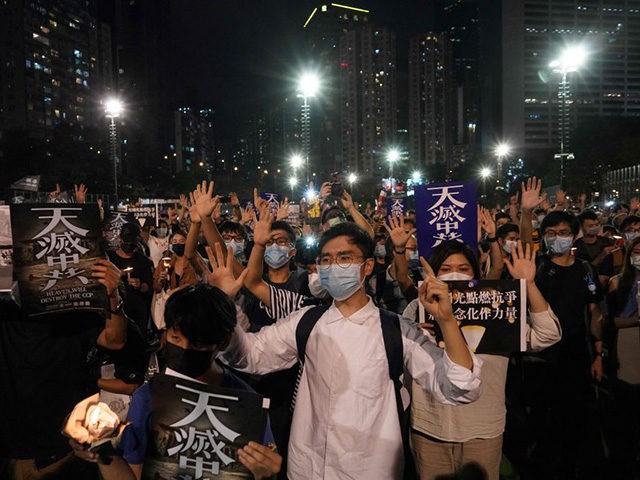One month after Hong Kong’s Beijing-controlled government signaled it would prohibit the annual candlelight vigil to commemorate the victims of China’s Tiananmen Square massacre, Hong Kong police made it official by banning marches on May 30 and June 4.
The police cited a pandemic-inspired limit on gatherings of more than four people to justify the ban.
The Hong Kong Free Press (HKFP) quoted the email sent to vigil organizers by the police on Thursday admitting there is no serious coronavirus outbreak in Hong Kong to speak of, but the marches will be banned anyway:
“Although coronavirus cases involving the mutant strain have not led to a community outbreak in Hong Kong, we must remain vigilant as neighbouring regions have seen a rebound in cases,” the email read.
“[T]he Government is unable to establish that the proposed organisation of the procession and the gathering would meet the [social distancing] conditions.”
The Alliance said it will appeal the police decision in accordance with the Public Order Ordinance.
“Mourning June 4 is Hongkongers’ collective memory over the past 31 years. The Alliance will continue to fight for people’s right to mourn June 4 legally,” their statement read.
Hong Kong announced zero new coronavirus cases for the first time in six months on Thursday. The island logged precisely three cases of questionable origin over the past week.
“Suppression of people’s freedoms is based on the need to control a surging epidemic; that justification is now lost on the back of these numbers today. Prolonged restrictions will only increase the burden on mental health. Without a local epidemic, the government can no longer hold Hong Kongers and businesses hostage with vaccination,” opposition Democratic Party spokesman Ramon Yuen Hoi-man declared on Thursday — a bit prematurely, as it turned out.
Hong Kong’s Leisure and Cultural Services Department (LCSD) announced on April 27 that applications for leases to hold public events in Victoria Park would not be processed. This led the Hong Kong Alliance in Support of Patriotic Democratic Movements of China to correctly suspect a more firm police ban on the Tiananmen Square events would be forthcoming, even as Beijing-controlled officials like Chief Executive Carrie Lam vacillated about an outright ban.
Alliance vice-chair Chow Hang-tung said last week that even if mass gatherings were prohibited, “some sort of vigil to commemorate June 4” would still occur.
“You can go down to the street and light a candle — that cannot be in any way against the law,” she pointed out. “We are asking Hong Kong people to light a candle at 8 pm, wherever you are. It’s a different way of organizing.”
“Light a candle wherever you are” has been the rallying cry of the Alliance ever since the LCSD effectively banned demonstrators from Victoria Park, which for three decades has been the scene of the largest Tiananmen commemoration to be held on Chinese soil.
Hong Kong banned the Tiananmen Square vigil last year on similar grounds. Thousands of Hong Kongers defied the ban and held group events anyway, only to see organizers prosecuted for sedition under the brutal “national security law” China imposed on Hong Kong last year to quell the enormous pro-democracy movement. Lam and other officials suggested the national security law could be invoked to justify permanent banning Tiananmen vigils, but for the moment they have mostly retreated to using the pandemic as an excuse.
A notable exception is Hong Kong security minister John Lee, who threatened Thursday to prosecute anyone who participates in a mass Tiananmen vigil under the national security law.
“The national security law clearly states that if anyone organizes, plans or carries out any illegal means to damage or overthrow the fundamental system under the Chinese constitution, it would constitute subverting state power,” Lee said, making no pretense of coronavirus safety as the reason for preventing the gathering.
As the HKFP noted, only a week ago Lam celebrated the return of mass public events as a sign of “Hong Kong’s gradual return to normality,” and a large music festival is scheduled for mid-June.
The Catholic News Agency (CNA) reported on Wednesday that seven Hong Kong churches will offer candlelight Mass vigils for the Tiananmen dead on June 4.
“For various reasons, we may not be able to speak openly, but we must not forget history. Let us offer the life-giving holy sacrifice of the Mass that the Lord of history may look upon those who died in the spring and summer in the pursuit of truth,” the Justice and Peace Commission of the Diocese of Hong Kong said.
Hong Kong Bishop-elect Stephen Chow said on May 18 that he may or may not attend a June 4 vigil this year, depending on “legal requirements.”
“Sometimes in the past, I would go and really commemorate in the public arena, but there were times that I couldn’t go, so I prayed. I pray for China. I pray for all those who have passed in 1989,” Chow said.
The Chinese Communist Party (CCP) murdered an uncounted number of demonstrators, many of them young students, in Tiananmen Square in June 1989. Estimates of the death toll range into the thousands. The CCP has been furiously attempting to erase the massacre from history ever since it occurred, forbidding discussion or commemoration among its citizens. Until the national security law shredded the last of Hong Kong’s supposedly guaranteed autonomy in June 2020, Hong Kongers were the only Chinese subjects with the freedom to hold massive public vigils for the Tiananmen dead.

COMMENTS
Please let us know if you're having issues with commenting.